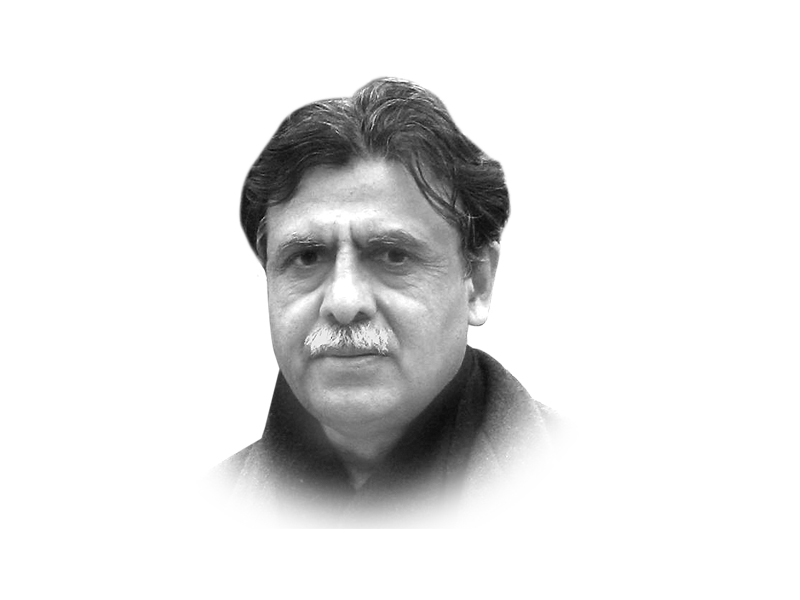
It is nearly two weeks since I have been in Singapore. I have yet to see a policeman at a public place. He is not even around the traffic crossings. An expatriate, who is an authority in mandarin affairs, solved the riddle. I could not see the police but the police could see me wherever I was. One just had to cross the line and witness the state reprisal. The city state is under the constant gaze of CCTV cameras. Singapore, as of today, is a success story of human ingenuity, starting from nothing in the backyard of the Malaysian peninsula, 50 years ago.
While looking through the window of the thirteenth floor apartment where I was staying, I could see water bodies simmering under the sun amid lush green expanses all around. This is a very common sight. Singapore consists of community living with gated precincts in high-rise apartments. Close to these habitats, hawker centres, where people drink, dine and spend their time, buzz with life. Orchard Road, in the downtown area, is considered the Champs-Elysees of the East. It boasts of brands and malls, with people thronging the cafes and bars on the walkways. As evening sets in, musicians and acrobats set the stage to delight the pedestrians.
The city state has made the best use of its location as a shipping hub and a site for oil refineries. It has turned human resource into a productive asset and over a period of time, has emerged as the safest and most promising destination for foreign investments. It now has a world class banking system, integrated with the global market.
A well-motivated and incentivised civil service has been the catalyst for change. It laid the foundation for a sound physical infrastructure and an industrial base, and provided the enabling operating framework to private entrepreneurs. The civil service was given a big helping hand by the ruling People’s Action Party, which has been at the helm since independence. Such a long spell, more often than not, breeds cronyism. The leadership has, however, realised that political longevity and corruption is a dangerous mix and has continually wielded a big stick against derelicts.
Singapore has managed its pluralism in an exemplary manner, giving each mix unbridled space to flourish and yet weld into an organic whole. One of the most important offices in the country, that of the speaker of parliament, is occupied by a hijab-wearing Muslim lady, Halimah Yacob, a lawyer by profession, who is known to be a tenacious trade unionist and experienced parliamentarian. She comes from a humble background and has preferred to live in a housing development board apartment even after her elevation to the position of speaker. While places like China Town and Little India showcase two distinct ethnic streams, resonance of the muezzin’s call from the Al-Sultan mosque, and a host of other places, continues to remind the Malays of their proud Muslim heritage. These assorted images fit into a fascinating tapestry of tolerance and mutual respect.
Singapore may not be the right bill to fit in our case. There are issues specific to scale and of divergent driving forces. Our security paradigm has been far too inexorable to give us breathing space and enough leeway. This has also affected our responses, apart from skewing our priorities. However, some inferences can still be drawn at a mundane level. Queuing up at public places and waiting for one’s turn is part of Singapore’s culture. Everyone is aware that they will not miss the deal by waiting in a queue. To inculcate such a culture, there must have been state sanction to begin with. Over a period of time, this has turned into a behavioural response. This reminds me of the grand feasts hosted by our political brass where tables were turned upside down well before the food was laid out.
Perhaps, our television talk shows should spare us some of the agony that they regularly spew and devote some time to civic education with a view to cultivating some basic tenets of collective living. Pakistan may perhaps, then, become a different place to live in.
Published in The Express Tribune, February 22nd, 2013.
COMMENTS (6)
Comments are moderated and generally will be posted if they are on-topic and not abusive.
For more information, please see our Comments FAQ
1719660634-1/BeFunky-collage-nicole-(1)1719660634-1-405x300.webp)

1732276540-0/kim-(10)1732276540-0-165x106.webp)

1732274008-0/Ariana-Grande-and-Kristin-Chenoweth-(1)1732274008-0-165x106.webp)
1732273396-0/Copy-of-Untitled-(72)1732273396-0-270x192.webp)
1732269802-0/Copy-of-Untitled-(71)1732269802-0-270x192.webp)
1732261957-1/Copy-of-Untitled-(66)1732261957-1-270x192.webp)


1732258132-0/BeFunk_§_]__-(26)1732258132-0.jpg)






@desi786: "I wish I could get SG nationality. " They are feverishly looking for immigrants because of their aging population and Indians have assimilated well as they always do. That gives a little edge to future aspiring citizens such as you. Indians are only next to Chinese in population.
SG is better than EU and others due to better law and order except 'Little India'. I wish I could get SG nationality. Can anyone tell us about 3 years reduced fee program and what is salary after doing MS Logistics
That city is all concrete but they don't have much choice because they don't have much land area available. The government is doing its very best to have as much greenery as possible. They made the best of the situation after seceding from a union with predominantly Muslim Malaysia. It has no drinkable water of its own and so has a contract with Malaysia to supply its water requirements. Singapore caught world's attention in the seventies of the last century when they arrested an American youth for vandalizing cars in his neighourhood. He was sentenced to 100 public lashes. The American government applied all the pressure it could so the sentence would not be carried out. No dice! Singapore is a tough law and order state. It is no wonder that its citizens have a "keen" civic sense. It has served them well!
But Singapore ruling elite will always be Chinese. Even in jobs they will still favour a Chinese over another group due to the demographic make-up of that country.
Fantastic food for thought. I wish our education system includes teaches children something about civic life as well. One may not expect poor families ignorant of these values themselves teach these things to their children. But as a nation, we must focus on our next generation for which those having this sense should take the lead....
"To inculcate such a culture, there must have been state sanction to begin with. Over a period of time, this has turned into a behavioural response."
Sorry, behavioral response begins at home, nurtured in schools, and practiced in public. Young children stand in line to go to " potty" in carnivals and no police is ticketing them even if they water the lawn.
Perhaps, expecting the authority to act rather than taking personal ownership of the problem is the primary issue of PAK?